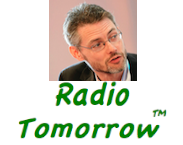Radio Tomorrow with James Cridland
This week, “BBC London 94.9”, the local radio station for London previously known as BBC LDN, and previously known before that as “GLR”, reverts to its original name of “BBC Radio London”.
Radio consultant and talent coach Larry Gifford recently posted a blog sharing his experiences at a Canadian sports game, where he was playing “guess the logo” with a Canadian friend – just trying to guess what companies actually did based on their name. A salutary lesson.
Back in the early days of digital radio in the UK, a lot of stations launched with funky new names. We were given stations called “6music”, “The Groove”, “The Lounge”, “Oneword”, “Core”, “Chill”, “The Arrow” and others. I think this was a mistake.
If the first thing you have to do, when calling clients, is to say “I’m calling from The Bee, we’re a radio station” then, it seems to me, there’s something wrong.
If you have to put pictures of radio sets on your posters to convey that “Magic” is the name of a radio station and isn’t a stage show or a baseball player, then I can’t help but wonder about the efficiency of this advertising.
Now: sure, many stations slap an FM or AM frequency onto their logo and hope that it adequately conveys that it’s a radio station. “Magic 102.5”, “612 ABC Brisbane”, “1010 WINS”, “106.2 The Bear”, and so on. And that’s fine: so long as the frequency actually means something.
However, increasingly, radio station frequencies don’t mean much. Almost all new platforms don’t use them. You don’t need frequencies for satellite radio, for online, for DAB, for radio through the TV. Even in the car, most new cars label the presets after the radio station stored there.
Further – regular readers already know I have a bit of a downer on AM’s longterm future, and it probably comes as no surprise that I’m not sure many young listeners instantly recognise an AM frequency.
Additionally: there’s nothing wrong with the word ‘radio’. We went through a patch in the 1980s where we changed the name of radio stations from “Pennine Radio” to “Pennine FM”, but almost every listener continued calling it “Pennine Radio” for years afterwards. It does the job, after all.
The word ‘radio’ (should) mean a great shared experience, a companion, someone you can trust. It’s a word that describes much, much more than just a transmission medium. (That, incidentally, is why I’m irked that Pandora has nicked it.)
So I’m delighted to see the BBC reclaim the word ‘radio’ for BBC Radio London. And, similarly, pleased to see that ‘Radio X’ is using it too.
It would seem to me that the word ‘radio’ should always be in your logo; and should always be in your station name – at least, whenever you use it off-air. Why wouldn’t you?
James Cridland will be speaking at the Australian Commercial Radio Conference on The Gold Coast, Friday October 9, 2015.
About The Author
 James Cridland is a radio futurologist, and is Managing Director of media.info, a companion website to radioinfo and AsiaRadioToday.
James Cridland is a radio futurologist, and is Managing Director of media.info, a companion website to radioinfo and AsiaRadioToday.
He has served as a judge for a number of industry awards including the Australian ABC Local Radio Awards, the UK Student Radio Awards, and the UK’s Radio Academy Awards, where he has also served on the committee. He was a founder of the hybrid radio technology association RadioDNS.
James is one of the organisers of nextrad.io, the radio ideas conference each September, and is also on the committee of RadioDays Europe. He writes for publications including his own media.info, Radio World International and RAIN News.
James lives in North London with his partner and a two year-old radio-loving toddler. He very, very much likes beer.
Radio Tomorrow is a trade mark of Radiowise Productions Pty Ltd.

